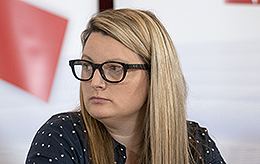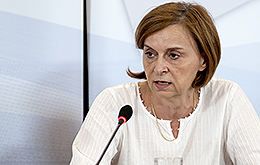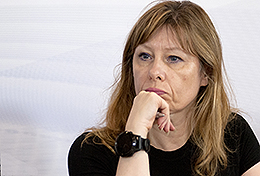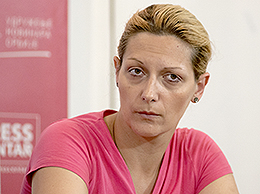Hotline: +381 61 63 84 071
Panel »Childhood in Serbia«: Poverty and side effects

Only 0,8 percent of women age 15 to 49 entered marriage before they were 15, while in Roma communities it mounts 16,9 percent. Moreover, it is estimated that around 0,2 percent of girls age 15 to 17 entered marriage before they were 15, while in case of girls from Roma communities that percentage equals 15,2 percent. Also, there is a visible disparity between women from general population and women from Roma community when it comes to the age of entering first marriage or common law marriage. 6,8 percent of women from general population and 57 percent of women from Roma community, age 20 to 49, entered their first marriage before turning 18. Data obtained from MICS survey indicate to huge importance of resolving this issue – while percentage of child marriages in general population is steadily decreasing, this percentage is increasing in Roma communities. In 2004, 45,9 percent of girls were married before turning eighteen, while in 2010 it mounted 53,7 percent, and kept increasing to 57 percent in 2014. This survey confirmed widely spread existence of child marriage practice. Ethnographic survey "Child marriages in Roma population in Serbia", UNICEF Serbia, October 2017.
A panel discussion “Childhood in Serbia”, organized by a weekly magazine "Vreme", focused on the ways in which side effects of poverty, such as child marriages and violence, reflect on the lives of children in Serbia, but also on how media jeopardizes child integrity. The panel was moderated by the "Vreme" assistant Editor in Chief, Jovana Gligorijevic, while panelists were Vesna Dejanovic from UNICEF, Jelena Hrnjak from NGO "Atina", an organization that provides assistance to human trafficking victims, Gordana Novakovic from the Press Council, and Bojana Selakovic, on behalf of Association "Roditelj".
Approximately 120,000 children in Serbia (9,5 percent) live in absolute poverty, while around 35 percent are at risk of poverty, as shown by the UNICEF data published in November 2018 to mark the Children’s Day (November 20). Side effects of poverty, such as child marriages and human trafficking, affect the most destitute – children from rural families and Roma communities. UNICEF statistics (MICS, 2017) reveal that 57 percent of girls from Roma community get married before they turn 18.
According to the most recent report of the Government of Serbia's Team for social inclusion and poverty reduction for 2017, income under the verge of absolute poverty (12,045 dinars) had 7,2 percent of citizens in Serbia. The report also notes that the percentage would mount to 8,9 percent if the households in rural areas hadn’t filled in the budget with home-grown produce. According to the Republic Statistics Institute survey from the same year, one quarter of citizens, that is around 1,8 million of people in Serbia, are at risk of poverty. "Extreme forms of poverty are nearly eradicated in Serbia, and the poverty risk rate has been decreased", Serbian Prime Minister Ana Brnabic stated in February 2019 while marking the Third national report on social inclusion and poverty reduction (the report refers to the period from 2014–2017, and it was published in December 2018).
CHILD MARRIAGE AS AN ESCAPE FROM POVERTY
 Jelena Hrnjak from NGO "Atina" feels that it is extremely inappropriate to speak about absolute poverty eradication in 2019. "Before New Year’s, we were asked by a government institution to engage in preparing Christmas gifts for children of a woman who was a human trafficking victim. We reached out to her, asked if they needed anything, and she told us it would be good if the children could have shoes," says Jelena Hrnjak. However, when asked about the shoe sizes for her children, the mother was not able to respond. "She told us that her children have never worn their size, as they always received shoes from someone, or they wore what they found in a dumpster," she said and emphasized that poverty goes hand in hand with various forms of violence. "There are children in Serbia who do not go to school, which is a deprivation of one right," said Jelena Hrnjak and reminded that 90 percent of Serbian citizens who are not members of the Roma minority group complete primary education, which is a case with only 28 percent of Roma population.
Jelena Hrnjak from NGO "Atina" feels that it is extremely inappropriate to speak about absolute poverty eradication in 2019. "Before New Year’s, we were asked by a government institution to engage in preparing Christmas gifts for children of a woman who was a human trafficking victim. We reached out to her, asked if they needed anything, and she told us it would be good if the children could have shoes," says Jelena Hrnjak. However, when asked about the shoe sizes for her children, the mother was not able to respond. "She told us that her children have never worn their size, as they always received shoes from someone, or they wore what they found in a dumpster," she said and emphasized that poverty goes hand in hand with various forms of violence. "There are children in Serbia who do not go to school, which is a deprivation of one right," said Jelena Hrnjak and reminded that 90 percent of Serbian citizens who are not members of the Roma minority group complete primary education, which is a case with only 28 percent of Roma population.
(Have you ever talked with your mom about marriage while you were a girl?) No, of course I haven't. I have never talked with her when I was a girl, definitely not. I have never actually talked with anyone about it. I didn’t even know what marriage was, but I wanted to experience it. I wanted to see what it was like and give it a try. Vranje, a woman J, 21.
She (the mother) doesn’t even know how she got married to my father. She was married when she was fifteen, gave birth when she was sixteen. She says – she was prepared by my father’s mother. She says, she made the bed for them. She says she thought she was a girl. She thought she would only sleep there. She went to bed and he came to her. She didn’t even know what marriage was supposed to be like, what was going to happen. Novi Becej/Novo Milosevo, a woman C, 37
Mother-in-law gets up in the morning, sits by the window and watches; you make coffee, make breakfast, lunch, dinner, do the laundry, line dry it…. (Did you have to do it as soon as you got married?) Yes, all that. (Did you know how to do all those chores, as you were only 15?). Yes, I knew because I was not born with a silver spoon in my mouth. We looked after livestock, we cultivated soil. My father and mother worked, mother in a private business, and father in tilery. And then when I wake up, by the time they are home from work, lunch has to be ready. (So, when you came to the household, you were a good daughter-in-law?) I was a good daughter-in-law (proud). Pirot, woman I, 39 (Statements within the ethnographic survey "Child marriages in Roma population in Serbia", UNICEF Serbia, October 2017)
"The rate of children’s exposure to poverty is still steep", believes Vesna Dejanovic from UNICEF. She remarks that financial givings that should impact a decrease of poverty rate (financial and social aid, child support) are not fruitful as "they are not directed properly" and "do not have a large enough scope". Dejanovic also remarks that the amounts are not adequate. "Financial and social aid reach only 11 percent of the most destitute, while child support has a somewhat bigger scope of a 45 percent of children, i.e. around 70 percent of children from the most destitute group," she said and emphasized that poverty is reaching its peak in phenomena such as child marriages and human trafficking. 
Vesna Dejanovic adds that there is no such formula that would accurately show a sample constellation which contributes the most to the frequent occurrence of child marriages. "It is undeniable that higher rate of family integration means decrease in child marriages in Roma community," she said and added that this trend has been noticed throughout UNICEF’s engagement in more than twenty Roma communities. Vesna Dejanovic also believes that poverty strengthens traditional practices such as child marriages, which represent a survival mechanism. Jelena Hrnjak points out that the number of early marriages is grounded on the number of marriages in the age group of 16 to 18 year-olds, which is a legal age for entering into marriage in Serbia, but does not include common law marriages entered by children. "The biggest number of identified human trafficking victims in Serbia are children," she stressed and added that the highest number of victims are found among minor girls who enter into marriages with significantly older men.
Jelena Hrnjak notes that girls’ testimonies reveal that such marriages are characterized by various forms of maltreatment and abuse: forced begging, forced criminality, sexual exploitation, "not only by family members, but by members of the extended community," emphasizes J. Hrnjak. "Forced prostitution of minors is a form of human trafficking. When it comes to minors, there is no consent, it is exploitation of children for the criminal act of prostitution," says Jelena Hrnjak and points out that it is an obligation of all citizens to report human trafficking. She recommends documenting and reporting such cases to the police, and reaching out to a civil society organization with capacities to follow up on the case. J. Hrnjak believes that it is uncertain if the law will be amended in future in Serbia in reference to prostitution. "Even though decriminalization and legalization of prostitution will be discussed in future, whichever decision is made in the legislature, it will not relate to child prostitution, which remains unacceptable."
Only 0,8 percent of women 15 to 49 years of age entered into marriage before they turned 15, while within Roma communities it amounts to 16,9 percent. Moreover, it is estimated that around 0,2 percent of girls 15 to 17 years old entered into marriage before they turned 15, while in case of girls from Roma communities that percentage equals 15,2 percent. Also, there is a visible disparity between women from general population and women from Roma settlements when it comes to the age of entering the first marriage or common law marriage. A total of 6,8 percent of women from general population and 57 percent of women from Roma communities, who are 20 to 49 years old, entered their first marriage before turning 18. Data obtained from MICS survey indicate a huge importance of resolving this issue – while the percentage of child marriages in general population is steadily decreasing, in Roma communities this percentage is still increasing. In 2004, 45,9 percent of girls were married before turning eighteen, while in 2010 it increased to 53,7 percent, and kept increasing to 57 percent in 2014. This survey confirmed widely spread existence of child marriage practice. Ethnographic survey "Child marriages in Roma population in Serbia", UNICEF Serbia, October 2017.
SEGREGATION AND LABELING
Bojana Selakovic from the Association "Roditelj" believes that, aside from extreme cases of human trafficking, we can talk about numerous examples which are not that radical but are a consequence of a poor systemic treatment of children. "In former Yugoslavia, one of mandatory resources was social responsibility and care for children," remarks Bojana Selakovic and stresses that it indicated to a clear, strategic approach of the country. She believes that today we have a situation where every child in Serbia is left to its parents or guardians. "On the one hand, we have everyone saying that children should be brought into this world, while on the other hand entire responsibility is delegated to parents, and thus the child’s destiny depends on their capacities alone," points out B. Selakovic.
Jovana Gligorijevic feels that economic disparity of children starts in kindergarten: children who cannot get a spot in state institutions can enroll in a private kindergarten thanks to subventions. However, the subventions offer basic package of services, so some of the activities that should be paid out of the pocket remain unavailable for some children. Bojana Selakovic reminds that the Rulebook on more detailed criteria for recognizing forms of discrimination by an employee, child, student, or a third party in an educational institution prohibits any form of segregation among children. "From logistics perspective, it is easier for parents if children have English or dance lessons in kindergarten, so they don’t have to take them to these activities elsewhere. Since we talk about public education," claims Bojana Selakovic "the availability of these services should be equal for every child".
Gordana Novakovic from the Press Council says that poverty issue is often covered in media through activities that are organized to provide help to the most desolate families. "I have no doubts in good intentions. However, even though ethics is not an exact science, I believe that one should wonder whether it is justified to label a child in that manner for the rest of his or her life".
BREACH OF CODEX
When it comes to reporting that includes minors, during the most recent published monitoring on respecting the Codex of journalists of Serbia in daily newspaper (for the period August - December 2018) Press Council noted 222 articles on minors in six out of eight analyzed daily newspapers. In these articles, 386 examples of breach of the Codex of Journalists of Serbia were spotted. Gordana Novakovic says that the biggest number of infringements pertained to the injury of a minor’s privacy, such as releasing a child’s personal information or data that enable public to identify a child.

Jovana Gligorijevic reminds about reporting on a murder investigation of the singer Jelena Marjanovic and the way in which certain tabloids wrote about her daughter Jana. "This case is probably the most extreme," states Gordana Novakovic and adds that bringing up children in the context of family tragedies is very problematic. Novakovic says that the Press Council received three reports that pertain to the published articles last year. "The reports most frequently arrive from non-governmental organizations, and citizens usually do not complain because they do not know they have the right to complain, and sometimes because they feel they consented to participate by giving consent for a child’s statement or by giving a statement themselves". She once again reminded that disturbing content which occasionally surfaces in daily newspaper, such as photographs of deceased children, is not allowed. "Ministry of Culture and Information had to respond to such published content, as the protection of minors falls under their authority by the Law on Public Information," she stresses.
Gordana Novakovic remarks on the visit of the President of Serbia, Aleksandar Vucic, to the Hemato-oncology department of the Institute for Mother and Child Healthcare in Belgrade, in February this year, when the President of Serbia took a photograph with a boy named Zlatan during the flu season without wearing a surgical mask. "That is another situation where ethical component can be questioned: even though the mother gave consent, the question remains if she was capable of making such assessment," claims Gordana Novakovic.
Iva Erakovic, Executive Director of Friends of Children of Serbia joined the discussion. She pointed out to, according to her, a neglected issue in Serbia that is intertwined with other issues. "One can hardly reach a child psychiatrist in Serbia," she emphasized and noted that, according to most recent statistics, 60 percent of children without parental care need this kind of support. As there is a small number of available psychiatrists, according to Iva Erakovic, majority of children can only resort to drug therapy. She also indicated to possible abuse of children in politics. "Our organization started its work in war environment, and now we are facing severe violation of child’s rights in a peaceful setting. If you go to websites of certain political parties, you can conclude that the population of 16-18 year olds is exposed to it the most," cited Iva Erakovic.
REPORTING AND CONSEQUENCES FOR CHILDREN
Personal data of the victims of violence and human trafficking have also surfaced in media. "Information on the court proceedings can be obtained only from authorized institutions," says Jelena Hrnjak and adds that NGO "Atina" appealed to institutions on numerous occasions to focus on preventing information leaks. Jelena Hrnjak believes that information leaks should be considered a criminal offense, "It is clear to us that there is an information leak if we read in an article that a proceeding is ongoing for a child from a foster family, whom several men had had a sexual intercourse with, and that those men will not be prosecuted, but will be witnesses in the proceeding. We encourage employees in institutions to report abuse ex officio," says Jelena Hrnjak and shares that in case of an information leaking the responsibility does not fall solely on the media that disseminates the information. Gordana Novakovic adds that the Press Council, having considered an appeal, established that the published information, that allegedly leaked, were actually untrue. "After the Ombudsman ordered looking into reports to establish where the leak occurred, it turned out that the information does not exist in the reports," says Gordana Novakovic.
Representatives of the Foundation SOS Children’s Villages Serbia, who were in attendance, noted that the hotline monthly receives around 10,000 calls from children, among which are calls that pertain to disturbing media content. Zeljka Burgund, children’s hotline manager, emphasized that disturbing media content causes an emotional response with children who cannot filter the content themselves as they are not mature enough. "When children hear something terrible happening to other children, regardless of whether it is a fiction or a real-life situation, it encourages them to project the situation on themselves," pointed out Zeljka Burgund. "If it is a case of a suicide, children place themselves in that situation, which leads to suicidal thoughts," she said.
Jelena Hrnjak says that NGO "Atina" has, through its practice, become familiarized with the cases where unprofessional reporting led to permanent consequences. She cites the case of a journalist who revealed the identity of a human trafficking victim in his post. "After the article was published, she cut her face so that nobody can recognize her," states J. Hrnjak and says that "Atina" informed the journalist on the incident. "It is of utmost importance to us to have people realize what their actions, or lack thereof, caused," stressed Jelena Hrnjak.
Vesna Dejanović from UNICEF says that this organization monitors daily releases, and conducts research with the purpose of creating a program response to these occurrences. She remarks that UNICEF, as an organization within the United Nations, has specific limitations in its mandate and thus cannot act upon individual cases. "However, we can contribute to raising awareness and information," she points out and adds that UNICEF makes efforts to engage media in the work of this organization.

"We are currently living in a state of self-help," believes Bojana Selakovic from Association "Roditelj". She says that a parent’s capacity to protect a child from becoming a part of a vulnerable group depends on a parent’s connection with the government, and how persistent and loud one is in their efforts. "Whenever a problem occurs which requires systemic involvement – from the moment you become pregnant, all the way to enrolling your child in university– you are playing an uncertain game, where the rules depend on how vulnerable a group is and how capable it is to protect itself or exercise a certain right," says Bojana Selakovic and assesses that in Serbia there is a problem with exercising basic rights and freedoms. She believes that, until the problems related to court independence and influence on prosecutors are resolved, civil society in Serbia will continue facing the existing issues.
Author: Jovana Georgievski
The original text: https://www.vreme.com/cms/view.php?id=1704482&print=yes published in VREME 1489, July 18, 2019 / EXTRA.
Video of the panel can be found via the link: http://presscentar.uns.org.rs/video/3202/video-snimak-okruglog-stola-detinjstvo-u-srbiji.html?print=true
The original text in .pdf form can be found here:












 FACEBOOK
FACEBOOK TWITTER
TWITTER YOUTUBE
YOUTUBE